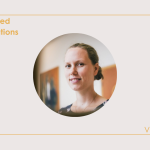
15 Dec Interview: the founders on 5 years of Comproved
Five years ago, after completing the research project of UAntwerpen, UGent and Imec in which they collaborated, researchers Maarten Goossens, Marije Lesterhuis and Roos Van Gasse decided to use the knowledge they had gathered and the tool they had developed to set up a company. Today we look back on five years of Comproved with them and glance into the future.
Congratulations on the fifth anniversary of Comproved! What does that do to you guys?
Roos: This is a milestone!
Marije: I am proud of where we are today. Five years ago, we had no idea what we were getting into.
Maarten: We are not very business-minded and it is not an easy market either, so I think we can be proud that we are doing so well.
How do you look back on those past five years?
Marije: Which period exactly? (laughs)
Maarten: On the one hand I found it a fun and challenging period, on the other hand I also felt insecure and overwhelmed at times. In the beginning it was very hard to find a balance in everything that comes with running a business. It still is sometimes, but the work is a bit more divided now.
Roos: It was a journey with ups and downs, from hooray experiences to moments when we wondered whether we should continue. But at every low point, we found each other and the reasons why we do it again and again. One of the reasons Comproved still exists today is because we are doing it with the three of us. That’s how I feel anyway.
What is your biggest motivation to do what you do?
Marije: Those are the moments when you hear from teachers that Comproved contributes to the quality of their education. That it is a way for them to assess better and to better involve students in assessment.
Roos: A big motivation for me are the aha-moments with teachers when they first hear about comparative judgement. You’re actually telling them something they already feel, which is that the traditional way of assessing is insufficient in many cases, and you’re offering them a solution for that.
Maarten: I would like to say that I do it for the money, but then I would have to do something else (laughs). Actually, I’m just very stubborn. What we are doing seems like a good idea. There are people who want to work with the method and our tool, and I want to help them the best I can.
As researchers, we come into contact with many other researchers and all kinds of new ideas. That inevitably has some influence on how we look at things at Comproved.
What moments from the past few years were the most memorable?
Roos: For me, that was the first time we signed a large multi-year contract. That was a confirmation that there are institutions that believe in us and that we are a worthy player in the field.
Maarten: An important moment for me was finding the right partner to develop the tool. The tool today is really good and completely tailored to education. That was not easy. Other moments that stand out are the expansion of the team and the group moments.
Marije: What has stayed with me is a brainstorming session during a summer dinner. Then we talked about the possibility of having students ask a personal feedback question in the tool. In my experience it was from that moment on, although it may not have been very explicit, that we started exploring the whole feedback thing. In the beginning, Comproved was an assessment tool with a focus on validity and reliability. Today, Comproved is also a (peer) feedback tool.
Roos and Marije, in addition to your work for Comproved, you are also researchers. How does that combine?
Roos: We pursue a kind of interaction. Comproved will never completely determine our research activities, but we do look for win-wins. For example, we always try to see what our insights from our broader research can mean for Comproved.
Marije: That’s right. As researchers, we come into contact with many other researchers and all kinds of new ideas. That inevitably has some influence on how we look at things at Comproved. Lately, for example, we are also putting more attention on how to use the tool to retrieve data for educational improvement. But, also to encourage active student learning with giving and receiving feedback. And those are not quite coincidentally our research areas.
In what direction is assessment evolving today?
Marije: Our slogan is ‘assess better, learn more.’ The ‘assess better’ remains crucial, but the focus lately is shifting more to the ‘learn more’ part. A lot of research has been done on better assessment. And there are still questions there. But I think now it’s also interesting to ask questions about how to learn from assessments as a team and as a student. How do you support that learning and how do you build that into your teaching?
Roos: Indeed, there is already a lot of empirical support for the reliability and validity of comparative judgement. We now want to do even more research on everything related to feedback. How students and organizations can learn from feedback. I am convinced that technology can support that as well. In Comproved, we can develop those insights around feedback even further.
Maarten: One evolution I see is that evaluation has become more of a group thing. It used to be a solitary activity. Today, however, teachers are responsible together, they make exams and correction sheets together, they revise together. There is also an evolution towards more formative practice, especially driven by The Netherlands. When we started the research project 10 years ago, it was mainly focused on summative evaluation. Now we are much more focused on formative. I think that is a good evolution.
What I see as a big challenge is that assessment is still very often the last thing people think about. That's where it often goes wrong. There should not be a too big a gap between what you do and what and how you measure it.
What are the biggest challenges within assessment?
Roos: I think there are challenges in terms of organizing assessment programs. For example, which aspects go within formative, which within summative and how do the two go together? What teachers also struggle with and what the tool can provide an answer to, are things like teaching students quality awareness and involving them in assessment.
Marije: Of course, one of the biggest challenges when it comes to assessment and feedback is that it just takes a lot of time. The better you want to do it, the more time it takes. While we can’t make it take less time with comparative judgement, we do think about how to make it easier. The time you put in should also pay off in better assessments and good feedback. The method alone feels natural, so that makes grading easier. Furthermore, we are also looking at how we can better support the feedback process and we are exploring how we can speed up the process of comparative judgement by using Natural Language Processing.
Maarten: What I see as a big challenge is that assessment is still very often the last thing people think about. That’s where it often goes wrong. There should not be a too big a gap between what you do and what and how you measure it. That might be harmful for the validity and reliability of your assessment. On the other hand, if you first determine how you want to make visible whether students have learnt something, it is then much easier to design your instruction and adjust it accordingly. Comproved can support this in the sense that the method challenges people to think about assessment beforehand. People ask themselves ‘if we want to assess in that way, what does that say about our assignment?’. That way assessment comes more to the fore. I think that’s a good thing.
What do you want to realise with Comproved in the coming years?
Roos: A dream that has been there from the beginning, but that we have never developed further, is to establish an academy in which we bring together research on assessment and feedback to empower people within their practice. We want to grow from an organization that currently focuses a lot on the tool, to an organization that has impact in various areas. That’s something we want to realize in the next 5 years.
Marije: Agreed!
Maarten: I would also like to reach even more people. Not necessarily with the tool, but with the way of thinking. I want to get assessment back on the agenda. At educational conferences you notice that the interest in assessment is disappearing. But you will never be able to do without it. Assessment in the traditional sense of the word may be disappearing, but it’s always going to be important to be able to determine what has been learnt, how has been learnt, and to what extent has been learnt.




